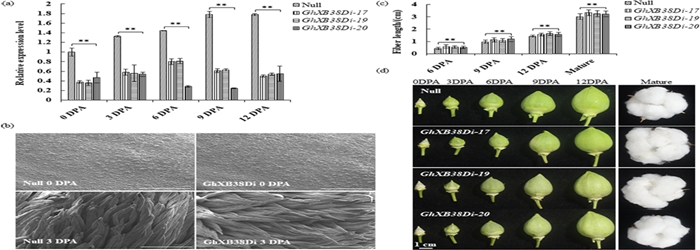GhXB38D represses cotton fibre elongation through ubiquitination of ethylene biosynthesis enzymes GhACS4 and GhACO1
Recently, researchers from Intelligent Design and Biosynthesis of Agro-microbes Team of Biotechnology Research Institute (BRI), Chinese Academy of Agricultural Sciences (CAAS) have functionally identified the gene, GhXB38D , which regulates cotton fibre elongation and involves in fibre elongation and development by modulating ethylene synthesis. The results were published in the internationally reputed journal “Plant Biotechnology Journal” entitled “GhXB38D represses cotton fiber elongation through ubiquitination of ethylene biosynthesis enzymes GhACS4 and GhACO1.”
Ethylene plays an essential role in the development of cotton fibres. The elongation and development of cotton fibers are important production indicators that affect the length and strength of cotton fibers, thereby affecting the quality and yield of cotton textiles. Ethylene biosynthesis in plants is elaborately regulated by 1-aminocyclopropane-1-carboxylate oxidase (ACO) and 1-aminocyclopropane-1-carboxylate synthase (ACS). However, the mechanisms of post-translational modification of ACO and ACS to control ethylene synthesis in cotton remains unclear.
In this study, scientists identified an E3 ubiquitin ligase, GhXB38D, which is highly expressed in cotton fibres during the rapid elongation stage. Suppressing GhXB38D expression in cotton significantly increases not only cotton fibre content (lint index and lint percentage), but also fibre elongation and mature fibre length. Further studies demonstrate that GhXB38D interacts with the ethylene biosynthesis enzymes GhACS4 and GhACO1 in cotton fibres and ovules, increasing the stability of GhACS4 and GhACO1 proteins, thereby modulating ethylene synthesis to participate in the process of fibre elongation and development.
Cumulatively, GhXB38D acts as a negative regulator of ethylene synthesis enzyme in its post-translational modification during cotton elongation and development. The discovery of GhXB38D explains the challenges in improving cotton quality through enhancing the transcriptional expression of ethylene signaling pathway genes. Additionally, it provides an effective target for improving cotton fibre quality through gene editing strategies and established a solid foundation for further unraveling the molecular mechanism of ethylene regulation in fibre development.
Professor Jin Wang (BRI of CAAS) and Professor Kaijing Zuo (Shanghai Jiao Tong University) are the corresponding authors. Doctoral student Qingwei Song (BRI of CAAS) is the first author of this research. This work was supported by the National Key R&D program of China and the National Natural Science Foundation of China.

By Wang Jin
(wangjin@caas.cn)
-
 Apr 18, 2024Opening Ceremony of the Training Workshop on Wheat Head Scab Resistance Breeding and Pest Control in Africa Held in CAAS
Apr 18, 2024Opening Ceremony of the Training Workshop on Wheat Head Scab Resistance Breeding and Pest Control in Africa Held in CAAS -
 Apr 03, 2024IPPCAAS Co-organized the Training Workshop on Management and Application of Biopesticides in Nepal
Apr 03, 2024IPPCAAS Co-organized the Training Workshop on Management and Application of Biopesticides in Nepal -
 Mar 28, 2024Delegation from the School of Agriculture and Food Science of University College Dublin, Ireland Visit to IAS, CAAS
Mar 28, 2024Delegation from the School of Agriculture and Food Science of University College Dublin, Ireland Visit to IAS, CAAS -
 Mar 25, 2024Director of World Food Prize Foundation visited GSCAAS
Mar 25, 2024Director of World Food Prize Foundation visited GSCAAS -
 Mar 20, 2024Institute of Crop Sciences (ICS) and Syngenta Group Global Seeds Advance Collaborative Research in the Seed Industry
Mar 20, 2024Institute of Crop Sciences (ICS) and Syngenta Group Global Seeds Advance Collaborative Research in the Seed Industry
